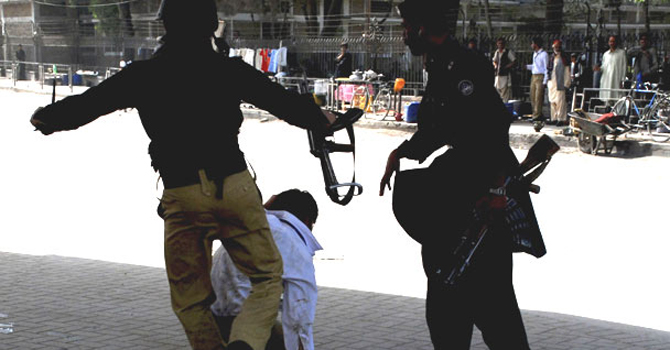TORTURE by law-enforcement agencies is so endemic it is often accepted as ‘police culture’. We only have to look at the overwhelming news reports and academic research for proof. And the reason it is so endemic is that there is little to no penalty or accountability against LEAs, and hence no effort to change this culture.
Today is International Day in Support of Victims of Torture. But Pakistani victims have little hope of receiving any form of support from the judiciary, executive or legislation.
The case of Sajid Masih is a telling — and appalling — example of broken governance. Sajid’s cousin was accused of blasphemy, due to which he was also roped in. They were both arrested and interrogated by FIA officials, during which they were reportedly beaten and abused. By his account, Sajid was allegedly ordered to rape his cousin. He refused. The officials shouted at him to do as he was told. He couldn’t, and jumped out of a fourth-floor window to escape the humiliation. The fall could have killed him. But he survived, albeit with multiple injuries, to tell his harrowing story.
An enforceable law criminalising torture is the need of the hour.
Stories such as these often go unnoticed. But it is when local and international press, along with human rights defenders, take up the matter that authorities are forced to respond. Following the outcry, a government official promises an inquiry. Similarly, in Sajid’s case, a senior FIA official stated, “An inquiry has been initiated against four officials. If found guilty, punitive actions will be taken against them.” And then, in a bizarre move, the FIA also filed a case of attempted suicide — a crime in Pakistan — against Sajid. Ludicrous.
It is important to remember that the investigation by LEAs is the first step in the criminal justice system. When this first step is ridden with abuse, it sets up a case for a faulty investigation — resulting in a faulty trial and subsequent faulty sentence and appeals.
Under Pakistani law, there is no specific offence that criminalises torture. Instead, a cocktail of different sections in the Pakistan Penal Code is used. Section 166 (“Public servant disobeying law, with intent to cause injury to any person”) can be employed, but the provision has rarely been used or enforced. Generally, a mixture of offences that constitute ‘hurt’ is used depending on the type of injuries inflicted. It is also an offence under Section 156 of the Police Order, 2002, but is not enforceable throughout the country. The lack of a specific offence, however, is not the only problem.
To enforce these provisions, it is the Code of Criminal Procedure that is applicable for investigation, trial and other procedural aspects. The main dilemma with this is that reporting and investigating torture is also done by the police, which cannot guarantee an independent and unbiased mechanism. Under the CrPC, if the police refuse to lodge an FIR, the victim can address the matter before a justice of the peace. However, the justice of the peace can only order the police to register an FIR, and it will still be the police who investigate the case. This is problematic as it exposes victims to further harassment, abuse and torture.
Pursuing litigation is expensive and time consuming for victims. And given the adversarial system followed in Pakistan, the court environment is often a cause for stress and further complications. These problems would not arise if a separate legislation criminalising torture is enforced, as these costs and problems would then be borne by the state, not the victim. Sajid’s parents did not have the means or influence to lodge a complaint against the FIA.
The offences of ‘hurt’ have been proven to be problematic as they are compoundable offences, allowing for the matter to be resolved through a compromise — without criminal accountability. Even when victims are successful in lodging an FIR against police officials, most people from marginalised and impoverished backgrounds cannot stand the pressure from a public official and give in to a compromise.
An enforceable law criminalising torture is the need of the hour. Political will, though sporadic, is also there. Three bills on the matter have been tabled by the PML-N’s Maiza Hameed and the PPP’s Farhatullah Babar and Farooq Naek. All of them have lapsed. Recently, Dr Shireen Mazari and Bilawal Bhutto-Zardari have also publicly stated they will table bills to criminalise torture, but it has yet to transpire. The reason is unknown and inexcusable.
The only way of moving the criminal justice system of Pakistan forward is by criminalising torture, which can only be done through a special law. This special law will need to take stock of the current problems so as to ensure that others like Sajid do not have to suffer similar fates.
By failing to criminalise torture, we are affirming the flawed system as sacred.
The writer is a criminal lawyer and advocacy technical coordinator of Justice Project Pakistan.
Twitter: @AndalibAziz
Published in Dawn, June 26th, 2019














































